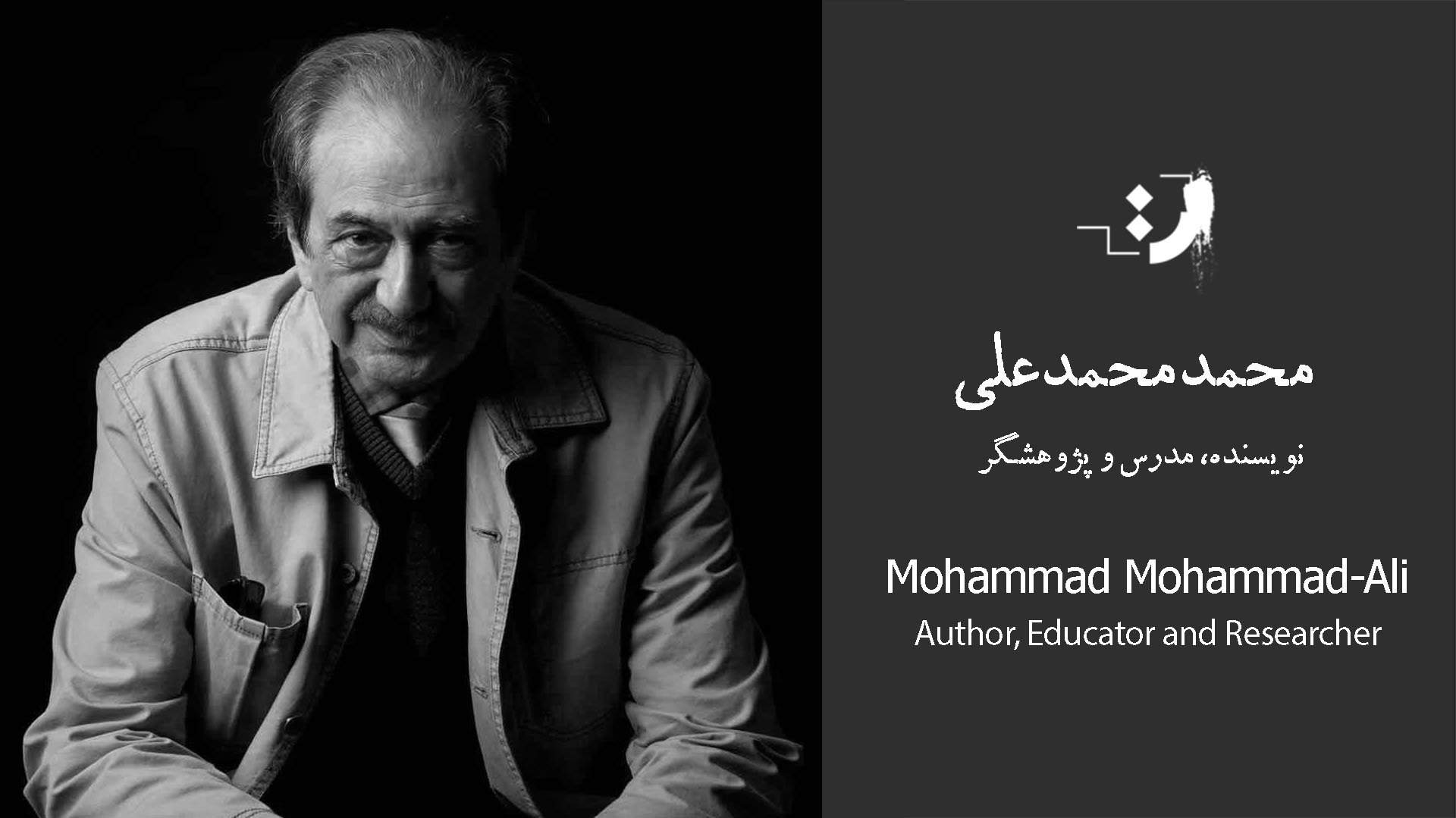Mohammad Mohammad-Ali

Biography
Mohammad Mohammad-Ali (April 27, 1948 – September 14, 2023)
Mohammad Mohammad-Ali was an Iranian writer, member of the Iranian Writers’ Association, fiction writing instructor, and researcher.
Early Life
Mohammad-Ali was born on April 27, 1948, in the Molavi Street of Tehran into a large family. His father was a merchant, while his mother, fascinated by tales like “Amir Arsalan Namdar” and “Pari Hamzeh,” introduced him to the world of storytelling. In 1964, he won first place in the regional Mother’s Day story-writing contest organized by the Iran-America Association. Mahmoud Sanai, his teacher at Marvi High School, played a significant role in encouraging his writing by helping him refine and edit his work.
In 1965, while still studying at Marvi High School, he wrote several plays and published the Marvi Yearbook. His editorial involvement in the yearbook earned him the first-place award in regional journalism, which was presented to him by then Minister of Education, Farrokhroo Parsa.
After graduating from high school in 1970, Mohammad-Ali was drafted into military service, serving in the Rural Development Corps. During this period, he began drafting the initial ideas for his stories “The Hindabad Valley Has Wolves” and “The Superiors.”
In 1974, he enrolled at the Faculty of Political and Social Sciences and later joined the National Retirement Organization. From 1990, he worked at the Ministry of Culture and Higher Education in the National Center for Scientific Documents and Archives until his retirement in 2002.
Before the 2009 presidential election, Mohammad-Ali emigrated to Canada with his wife to spend the rest of his life alongside their children.
Literary Career
Mohammad-Ali published his first book, “The Hindabad Valley Has Wolves,” a collection of short stories, in 1975, portraying the hardships of rural life in a realistic manner. In 1977, he joined the Iranian Writers’ Association, where he served as an accountant and financial committee officer for 17 years. His interaction with poets and writers, particularly Nader Naderpour, gradually shifted his writing from memoirs and report-like narratives to symbolic storytelling with social themes.
He was an active participant in the Thursday storytelling workshops led by Houshang Golshiri. After returning from the Soviet Union, he served as the editor-in-chief of the literary journal “Borj” from 1980 to 1982. He also collaborated with publications such as “Donya-ye Sokhan” and “Adineh,” editing three special issues on poetry and fiction for the latter.
In 1986, he co-founded the “Tuesday Poets” meetings alongside Javad Mojabi, Mohammad Mokhtari, and Hamid-Reza Rahimi. That same year, he published “Retirement and Other Stories,” depicting the struggles of retired individuals. This book earned him the “Twenty Years of Fiction Writing” award.
In 1994, Mohammad-Ali was among the 134 writers who signed the “We Are Writers” manifesto. His novel “The Hidden Role” was translated into Turkish and published in 2006.
After retiring, he taught fiction writing at the “Karnameh” Cultural Institute in Iran and later continued teaching at the Vancouver House of Culture and Art after immigrating to Canada.
The Armenia Bus Incident
Mohammad-Ali was one of the cultural figures targeted in the “Armenia Bus Incident” in 1996, during the chain murders of intellectuals in Iran. The plot, orchestrated by the government, aimed to assassinate a group of writers by driving their bus off a cliff en route to Armenia. He recounted the journey of the 21 writers in a series of articles published in the “Fath” newspaper in 2000.
Personal Life
In 1975, he married Nasrin Keyhani. Two days before the 2009 presidential election, he emigrated to Canada with his wife to live near their children. Mohammad-Ali spent 30 years working in the National Retirement Organization and the Ministry of Science and continued teaching fiction writing at Karnameh Cultural Institute in Iran and the Vancouver House of Culture and Art.
Writing Style
Mohammad-Ali’s works realistically depict the struggles of impoverished people, blending symbolism with social realities. Themes of death and mortality frequently appear in his novels. He also exhibited a special focus on water-related issues and their socio-cultural implications. His narratives often feature multiple voices, with stories unfolding through different narrators, including the narrator-writer. Most of his novels incorporate elements of uncertainty and suspense in their conclusions.
Published Works
Short Story Collections:
The Hindabad Valley Has Wolves (1975)
The Superiors (1978)
Retirement and Other Stories (1986)
The Second Eye (1994)
Regret in Facing the Mirror (1999)
Novels:
Thunder Without Rain (1991)
The Hidden Role (1991)
The Wet Beliefs of a Dead Man (1997)
Naked in the Wind (2000)
The Story of Tahmineh (2003)
Adam and Eve (2003)
Jamshid and Jamak (2004)
Mashi and Mashiane (2007)
The World of the Living (2015)
Striped Speeches – The Unfinished Story (2023)
Other Works:
Editor of “Borj” Quarterly (1980-1982)
“Mes” Literary Journal (1986)
“Three Interviews” with Ahmad Shamlou, Mahmoud Dowlatabadi, and Mehdi Akhavan-Sales (1993)
“Call of the Sages” (1994) in “Takapo” Magazine
- Birthday: April 27, 1948
- Death: September 14, 2023
- Birthplace: Tehran, Tehran, Iran
Author, Educator and Researcher
